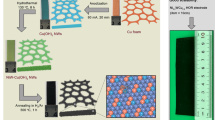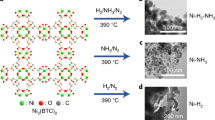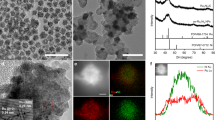Abstract
Two factors have to be borne in mind in considering the possible widespread application of fuel cells, namely, the world supply and the cost of the catalysts. Slaughter and Gilvarry1 have pointed out that only a few hundredths of 1 per cent of the world demand for power could be produced by hydrogen–oxygen fuel cells using the entire world production of platinum. Consequently, attempts have been made to find cheaper and more readily available materials, even though platinum is a superior catalyst. Sintered powdered nickel has been used, for example, by Bacon2, but a performance comparable to that of platinum at ambient temperatures can only be obtained at 200° C. Another variant, which eliminates the need to go to a higher temperature, is Raney nickel3. More recently it has been shown that a performance only slightly less than that of the noble metals can be obtained with ‘Teflon’ bonded nickel boride supported on a nickel screen4–7. At the same power-level and the same operating efficiency, the cost of these electrodes is only one-twentieth of those containing platinum. It is also interesting to note that cobalt molybdate8 is almost as good as platinum black in catalysing the electrochemical oxidation of hydrocarbons such as propane and propylene.
This is a preview of subscription content, access via your institution
Access options
Subscribe to this journal
Receive 51 print issues and online access
$199.00 per year
only $3.90 per issue
Buy this article
- Purchase on Springer Link
- Instant access to full article PDF
Prices may be subject to local taxes which are calculated during checkout
Similar content being viewed by others
References
Slaughter, G. I., and Gilvarry, J. J., Electrochem. Technol., 2, 249 (1964).
Bacon, F. T., Fuel Cells, edit. by Young, G. J., 51 (Reinhold Publishing Corp., New York, 1960).
Justi, E. W., and Winsel, A. W., J. Electrochem. Soc., 108, 1073 (1961).
Jasinski, R., Paper presented at 123rd National Meeting, Electrochem. Soc., Pittsburgh, Pa., April (1963).
Jasinski, R., Paper presented at 145th National Meeting, Amer. Chem. Soc., Division of Fuel Chemistry, New York, preprints, 7 109 (1963).
Jasinski, R., 18th Ann. Power Sources Conf., Power Sources Division, U.S. Army Signal Research and Development Laboratory, Fort Monmouth, N.J., 9, May 1964.
Jasinski, R., Paper presented at Fall Meeting, Electrochem. Soc., Washington, D.C., Oct. 1964, Abst. 16.
Thompson, C. E., U.S. Patent 3,116,169 (Dec. 31, 1963).
Thacker, R., Research Laboratories, General Motors Corp., Res. Rep. Ec–85 (Nov. 30, 1964).
Thacker, R. (submitted to Electrochem. soc.).
Kordesch, K., and Marko, A., J. Electrochem. Soc., 107, 480 (1960).
Haldeman, R. G., Colman, W. P., Langer, S. H., and Barber, W. A., 145th National Meeting, Amer. Chem. Soc., Division of Fuel Chemistry, New York, preprints, 7, 118 (1963).
Paul, R., Buisson, R., and Joseph, N., Indust. Eng. Chem., 44, 100 (1952).
Brown, C. A., and Brown, H. C., J. Amer. Chem. Soc., 85, 1003 (1963).
Author information
Authors and Affiliations
Rights and permissions
About this article
Cite this article
THACKER, R. Performance of a Nickel Boride Fuel Cell Anode using Hydrogen and Ethylene. Nature 206, 186–187 (1965). https://doi.org/10.1038/206186a0
Issue Date:
DOI: https://doi.org/10.1038/206186a0
This article is cited by
Comments
By submitting a comment you agree to abide by our Terms and Community Guidelines. If you find something abusive or that does not comply with our terms or guidelines please flag it as inappropriate.



